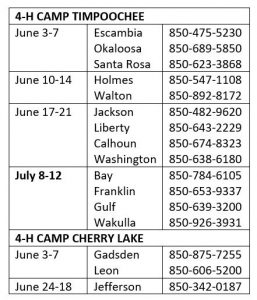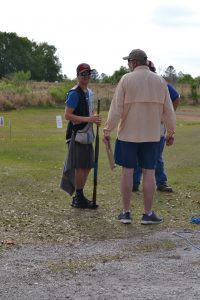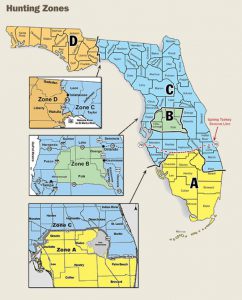by Melanie Taylor | May 1, 2019

Making friends at 4-H Camp in the early 1990’s (Melanie Taylor, Gulf County 4-H Agent, on right)
4-H Summer Camp preparations are in full swing all over the state. As a 4-H agent preparing for our week of county 4-H camp, my days are busy with phone calls and emails from parents, teen counselor training, adult volunteer screenings, paperwork, paperwork and more paperwork. Although it’s busy time for me as a 4-H agent, it also allows me to reflect why I chose this career path and why there is a sense of nostalgia as I prepare for 4-H camp.
Camp Memories
I grew up in Virginia and attended 4-H camp every year from age 9-18. I was a camper that grew into a counselor-in-training and then a full-fledged counselor. Those weeks of 4-H camp were filled with hot days and warm nights, but it was worth it all for the memories I’ll have for a lifetime. I can still smell the cafeteria food and hear the sounds in the gymnasium as kids played basketball and pounded at their leather-craft projects. I still get the chills when I think about our entire camp singing around the campfire circle and patiently waiting for a canoe, filled with camp staff, to land on the lakes edge. The staff would enter the campfire circle carrying the flame and ceremoniously light the fire. I’m still connected with my 4-H camp friends through social media and/or as close friends, and we continue to share our old, blurry camp pictures from the 1990’s each year on Facebook.

Memories to Last a Lifetime…
This is why I work hard to prepare camp for my county campers and teen counselors – I want to create similar memories for them. In 10, 20 or 30 years from now, I want them to think back on the fun moments they experienced in the Florida 4-H camping program. I want them to form friendships and make camp connections for a lifetime, whether it’s learning to kayak, fish, making arts and crafts, cooking over a campfire, singing camp songs and much more.
With all of this said, I hope you as parents will consider giving your child(ren) these special moments. The days are long, but fun, and nights are filled with campfires and hanging out with friends. When they arrive home on Friday, they’ll be exhausted but so excited to share all of the camp songs with you (prepare yourself for lots of loud, enthusiastic singing). They’ll have new friends they want you to meet and tell you camp stories they’ll always cherish.
When is Your County Camping?
In northwest Florida, there are two 4-H Camps:
4-H Camp Timpoochee in Niceville and 4-H Camp Cherry Lake in Madison.
Each county in these camping districts has one week of camp each summer.  Contact your local UF/IFAS Extension Office now
Contact your local UF/IFAS Extension Office now
to find out the details and register your child for a week of fun and memories!
by Marie Arick | Mar 28, 2019

Tropicana Speech Contest
Liberty County 4-H’s Annual 4-H/Tropicana Public Speaking Contest included a special guest speaker with a uniquely delivered speech!
Ms. Delmy Pineda, a sixth grader at W.R. Tolar School, suffers from Cerebral Palsy. Delmy shared with her therapist, Kara Bradley, her desire to participate in the Tropicana Speech Contest. Delmy knew this was her last chance to participate being a sixth grader, so together, the two set out to make this happen.
So why is this so different? Delmy’s primary vehicle of communication is via a speech assist device. Yes, a computer-generated voice provided through a computer program. A first for any competitor.
Delmy wrote her speech, “Who Runs the World”, presented it and won in her class! Although she did not win in her school competition, Delmy embraced the opportunity and really championed the spirit of the competition. With that spirit in mind, the school administration asked if she could present at the County Competition as an honorary speaker. Of course, Delmy was added to the program without hesitation. Delmy presented her speech utilizing her speech assist device, a first for the Tropicana Competition. Delmy received a standing ovation. At that moment, Delmy was running the world.
For more information about the 4-H/Tropicana Public Speaking Program, or any other opportunities for your child, please contact your local UF IFAS Extension Office.
by Taylor Wilken | Feb 1, 2019
 Last year, 520 youth and 170 adults from 34 Florida counties told the 4-H story filling the state capitol with 4-H advocates. Youth educated their representatives, senators, and legislative aides on how 4-H has made an impact in their lives while experiencing the political processes of state government.
Last year, 520 youth and 170 adults from 34 Florida counties told the 4-H story filling the state capitol with 4-H advocates. Youth educated their representatives, senators, and legislative aides on how 4-H has made an impact in their lives while experiencing the political processes of state government.
A sea of green will flood the Florida’s state capitol Thursday, April 4, 2019, as Florida 4-H members, faculty, volunteers, and families participate in the annual 4-H Day at the Capitol event.

2018 attendees on the steps of Florida’s historic capitol building.
4-H Day at the Capitol
- Who: All 4-H Members, Friends, Family and Alumni
- When: April 4, 2019
- Where: Tallahassee, FL
- Cost: $15 (includes lunch and a 4-H polo)
- Registration: February 1-28, 2019 in 4-H Online
Schedule
- 7:30-8:15am – Check-in
- 8:30am – Opening Assembly
- 9:00am – Group Photo
- 9:15am – Meetings with Representatives and Senators begins
- 12:00-1:00pm – Lunch Available for Pick-up (Chik-Fil-A)
- 1:00-1:30pm – Closing Assembly
Each county is encouraged to make appointments with senators and representatives and should schedule their day how it best suits the group. For detailed information on the schedule and to prepare for the event, be sure to read the The 4-H Day at the Capitol Guidebook.
Places to Visit/Things to do
Close to the Capitol, you’ll find several things to do to fill in the rest of your day.
- Governor’s Mansion
- Knott House
- Riley House and Museum
- 4-H Day at the Capitol Scavenger Hunt
- Florida Historic Capitol Museum
- Museum of Florida History
- Big Bend Farm
- For more information, check out Explore Tallahassee
Resources
For more information on 4-H Day at the Capitol or 4-H in your county, contact your local UF/IFAS County Extension Office.
by Jena Gilmore | Jan 18, 2019
While this year’s hunting season is winding up, it’s never too early to think about getting ready for next year. Whether it’s deer, squirrel, ducks, dove or turkey, there are important hunting rules and guidelines both youth and adults must follow. Organizations like the Florida Fish and Wildlife Conservation Commission (FWC) and your local UF/IFAS Extension Office provide programs to keep you on target each hunting season!

Safety is a key element of any shooting sport.
SAFETY FIRST
Each hunter must take some version of the Hunters Safety Education course. Anyone born on or after June 1, 1975, and 16 years or older, must pass a hunter safety course before a hunting license can be purchased. There are four options to complete this requirement:
- Traditional Course and Skills Day
– Face-to-face instructor led course
– Hands-on skill day – register here
- Online Course and Skills Day (two part process)
– Complete one of the online courses
– Hands on skill day – register here
- Florida Virtual School Outdoor Education
– FREE to Florida students in grades 9-12 or ages 12-18
– Apply here
– Earn 0.5 credit for high school
- Firearms Safety Certification and Online Course
– Adults only
– Must have completed previous firearms training
– Must complete one of the online classes in Option 2
– Follow procedures outlined in the Application for Hunter Safety Certification
If you’re using the Hunter Safety Mentoring Exemption and hunting under the supervision of a qualified hunter, you are exempt from this requirement.

Our district covers Zone D – Escambia to Gadsden/Wakulla & Zone C – Leon & Jefferson. Map courtesy of FWC.
Find Your Zone
Hunters should strive to be good stewards of Florida’s resources to keep this sport a tradition for generations to come. Take the time to determine what hunting zone you live in. Your zone determines your hunting season – meaning the appropriate time you can collect specific game in that area. You can find the Florida Hunting Zones Map here: http://myfwc.com/hunting/season-dates/zone-map/. Next, check the annually updated hunting season dates and bag limits related to your zone to stay in compliance with FWC regulations: http://myfwc.com/hunting/season-dates.
4-H Shooting Sports
Find your local UF/IFAS Extension Office and determine if there is a 4-H Shooting Sports program in your county. Participation in a 4-H Shooting Sport program provides year-round opportunities for youth to not only practice their discipline but also to explore other disciplines in a safe, inclusive, environment with 4-H volunteers/mentors!

4-H grows important life skills like responsibility, goal setting and teamwork in youth through shooting sports.
4-H Shooting Sports includes air rifle, small bore rifle, archery, shotgun, muzzleloading and hunting and develops important life skills in a safe and educational environment. Shooting sports day camps are popular during the summer, so ask you 4-H Agent if one will be scheduled for you county.
Attention Volunteers!
Would you like to become become 4-H Level 1 Certified to coach and teach youth shooting sports? If you are already enrolled as a 4-H volunteer, log in to your profile and register for the February 16th hands-on training in shotgun and archery. You’ll also complete five online learning modules as part of your training. If you’re new to 4-H, enroll at florida.4honline.com, and let your county 4-H Agent know that you are interested in teaching shooting sports.
Explore the links below to see how you and your youth can get involved in 4-H and stay up to date on the hunting regulations for your area:
by Melanie Taylor | Jan 11, 2019

Be mindful and enjoy the moment.
Now that the busy holiday season is over, it’s a time to reflect on the past but prepare and refocus for the new year ahead. As we focus on the new year, it is always refreshing to have a clean slate. As the year begins to unfold, there are tips to help you manage your day-to-day stress levels. It begins with mindfulness.
What is mindfulness?
Mindfulness means paying attention in a particular way; on purpose, in the present moment, and non-judgmentally.” Dr. Jon Kabat-Zinn (1991)
Mindfulness is best thought of as a way of being rather than an activity Almost any activity can be carried out with mindful awareness.
Three Key Features of Mindful Awareness:
- Purpose – intentionally and purposefully directing your attention rather than letting it wander.
- Presence – being fully engaged with and attentive to the present moment. Thoughts about the past and future that arise are recognized simply as thoughts occurring in the present.
- Acceptance – being non-judgmental toward whatever arises in the moment. This means that sensations, thoughts, and emotions are not judged as good or bad, pleasant or unpleasant; they are simply noticed as “happening” and observed until they eventually pass (Naik, Harris and Forthun 2016).
Mindfulness is a mind-body practice that has been found to benefit both psychological and physical health. The primary psychological change that occurs during mindfulness practice is an increased awareness of thoughts, feelings, and sensations in the present moment. Over time, mindfulness practice can help you to become aware of the space between noticing experiences and reacting to them by letting you slow down and observe the processes of your mind (Black 2010).
The ultimate goal of mindfulness practice is for you to take advantage of this space so you can make more intentional decisions – to wake up from living life on autopilot, based on unproductive habits of mind
(Black 2010; Walach et al. 2007).
According to the American Psychological Association, some empirically supported benefits of mindfulness include the following (Davis & Hayes 2011):
Psychological Benefits
- Increased awareness of one’s mind
- Significantly reduced stress, anxiety, and negative emotions
- Increased control over ruminative thinking (a major cause and symptom of depression and anxiety)
- Increased mental flexibility and focus
- More working memory
- Decreased distracting thoughts
- Decreased emotional reactivity
- Increased capacity for intentional, responsive behaviors
- Increased empathy, compassion and conscientiousness of other’s emotions
Physiological Benefits
- Enhanced immune system functioning
- Increased brain density and neural integration in areas responsible for positive emotions, self-regulation, and long-term planning
- Lowered blood pressure
- Lowered levels of blood cortisol (a major stress hormone)
- Greater resistance to stress-related illnesses such as heart disease
Spiritual Benefits
- Increased self-insight and self-acceptance
- Increased acceptance of others
- Increased compassion and empathy
- Increased sense of morality, intuition, and courage to change
- Increased control over automatic behaviors
- Increased self-discipline
The question is, how many of us would like to benefit from mindfulness if it provides these positive benefits? All of us should strive to lower our stress level and enjoy our daily lives with a more positive attitude and more attentiveness. So, how can we incorporate this into our lives? The majority of this practice is about familiarizing yourself with what it feels like to be mindful, and getting better at “remembering” to maintain mindful awareness.
Experiment with creating your own mindfulness practices throughout your day. Being mindful of the sensation on the soles of your feet as you walk to your car or the taste and texture of your morning coffee can transform routine moments into deeply satisfying practices. However, having a ritualized and structured practice can be beneficial. To find out more about practicing mindfulness and how to incorporate a more structured practice in your life visit read Mindfulness: An Introduction.
Sources: Mindfulness: An Introduction. 2013, 2016. Retrieved from the UF/IFAS Extension Electronic Data Information System: https://edis.ifas.ufl.edu/fy1381. Publication #FCS2335
 Contact your local UF/IFAS Extension Office now
Contact your local UF/IFAS Extension Office now 








